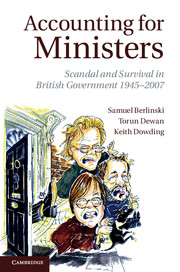Book contents
- Frontmatter
- Contents
- List of figures
- List of tables
- Preface and acknowledgements
- 1 Introduction
- 2 Managing the cabinet: principal–agent relations in government
- 3 The structure of British government
- 4 Who serves in government and how long do they last?
- 5 The prime minister and cabinet
- 6 Performance measures and forced exits
- 7 Ministerial performance and tenure
- 8 Conclusion
- References
- Index
5 - The prime minister and cabinet
Published online by Cambridge University Press: 05 April 2012
- Frontmatter
- Contents
- List of figures
- List of tables
- Preface and acknowledgements
- 1 Introduction
- 2 Managing the cabinet: principal–agent relations in government
- 3 The structure of British government
- 4 Who serves in government and how long do they last?
- 5 The prime minister and cabinet
- 6 Performance measures and forced exits
- 7 Ministerial performance and tenure
- 8 Conclusion
- References
- Index
Summary
In the previous chapter we have shown, perhaps surprisingly, that the length of time that a minister serves in British politics is related to personal characteristics that are fixed at the time of their appointment. This relationship holds even when we consider aspects such as prime ministerial style that might confound it. Whilst these results might inform us about important power relations in British society and politics, the aim of this book is to go beyond this analysis in exploring the political relationships that define ministerial careers in the UK, and to use our analysis to draw wider inferences about the nature of accountability in parliamentary democracies. Perhaps the most important relationship that defines a ministerial career is that which the minister maintains with the prime minister. As we have already noted, the prime minister is responsible for the hiring and firing of ministers. She thus directly controls our key variable of interest: ministers care about the length of their service; and the length of their service is thus reflective of the minister's relationship with the chief of the executive.
The importance of this relationship is not lost in the analysis of ministerial turnover that takes place in the British press and in much of the academic literature on the subject.
- Type
- Chapter
- Information
- Accounting for MinistersScandal and Survival in British Government 1945–2007, pp. 87 - 116Publisher: Cambridge University PressPrint publication year: 2012



